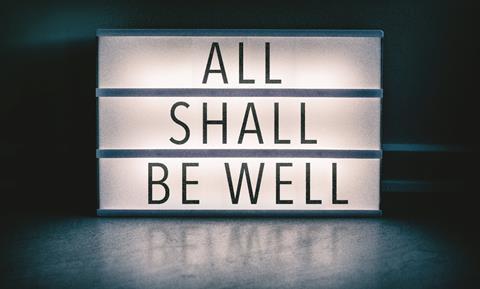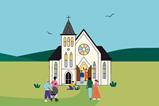
For much of last year, the lightbox in my office displayed the words: “All shall be well.” The full quote from Julian of Norwich reads: “All shall be well, and all shall be well, and all manner of thing shall be well”; the repetition resonant of the constant and regular comfort that we need as we navigate the rollercoaster of life.
For me, Julian’s refrain has become a mantra that I come back to when the world just feels too much; too dark, too painful. It’s an arrow prayer to ward off anxiety, a reminder that in the end, God has got us.
Living in the now and the not-yet can be exhausting. As Christians, we believe and often talk about living in this in-between space – following Christ’s death and resurrection and looking ahead to God’s kingdom when all things will be made new, when all shall be well – the glorious hope at the end of all things. But can I let you into a secret?
There have been times in recent years when I’ve been so overwhelmed by the scale and prevalence of terrible things happening in the world, that it’s driven me almost to despair. You might recognise the feeling. The anxious knot in the stomach caused by the weight of the world’s heaviness.
This feeling often arises when reading the news headlines or listening to the radio in the morning – the cost of living crisis, the wars, the lack of moral leadership in our nation and around the world.
There are some stories where the headline alone causes me to well up, like the tragic story of twelve-year-old Archie Battersbee, whose family entered into a legal dispute to stop his life support machine from being turned off.
I can no longer engage with the horrific stories coming out of Ukraine and, during the record-breaking heatwave in the UK in July, I found myself lying awake thinking about my two boys having to cope in even more sweltering heat when they are adults, because of climate change and the mess we have made of the planet. I find myself teetering on the brink of existential dread as I look ahead to the potential horrors of the future.
In such moments, I try to hold on to Julian of Norwich’s words. I try to summon up the bravery that is asked of me in Joshua 1:9: “Be strong and courageous! Do not be afraid or discouraged. For the Lord your God is with you wherever you go” (NLT). I try to remember to take heart, that Christ has “overcome the world”, despite the troubles that we see around us (John 16:33). But here, I’m confessing that I find it incredibly hard to choose hope instead of despair and anxiety; and I suspect I am not the only one.
We often talk about the problem of evil as being one of the main barriers atheists have to believing in God. “How can a good God let bad things happen?” they ask. But we talk less openly about the questions we Christians ask about suffering even when we do believe in a God who is inherently good.
I predict that more and more people will be looking for answers to these big questions. We need to be ready. Not just with well-rehearsed apologetics, but with compassion and the bravery to sometimes admit that we don’t know why; and that we too are anxious. What we can offer is the solidarity that Christ showed us through his incarnation; his suffering alongside us. Immanuel.





































No comments yet